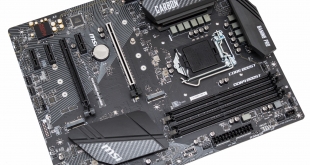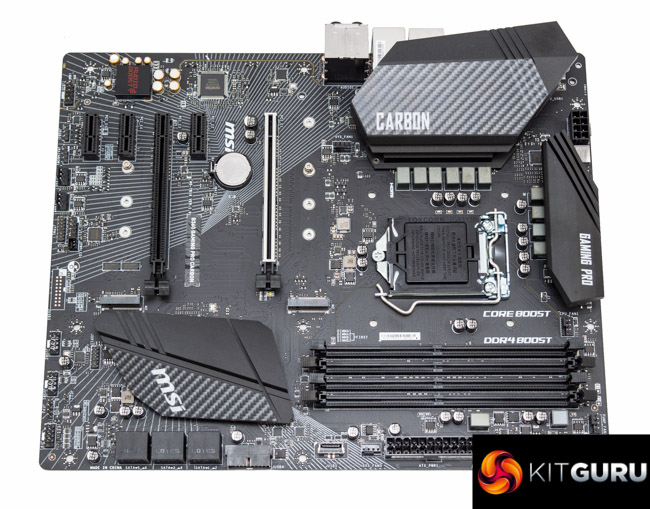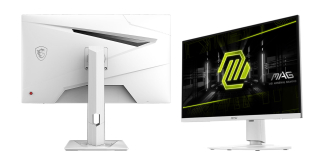
There are many suitable alternatives to Z370 motherboards for prospective buyers of Intel 8th-generation “Coffee Lake” processors. KitGuru has already assessed a number of H370 motherboards and today we are examining the B360 chipset, specifically MSI's B360 Gaming Pro Carbon, pitched as a more affordable but slightly cut-back variation of H370.
B360, like H370, has notable feature limitations like no support for CPU overclocking or multiple graphics card configurations (from CPU PCIe lanes) as well as memory frequencies being limited to 2,666MHz. In essence, B360 is targeted at a desktop user with a locked Core i3, i5 or i7 CPU, single graphics card and a modest configuration of system memory and storage.
That said, the ability to deploy a locked Core i3, i5 or i7 along with a single high-performance graphics card, 16GB of RAM and a couple of SSDs of SATA and PCIe type is still going to deliver a high-performance computing experience for the vast majority. We've seen from Z370 motherboard reviews that the performance gains from CPU overclocking are noticeable, but not game-changing, with there being enough performance available from Intel's stock turbo behaviour.
B360 adds a few more limitations than H370, including fewer chipset PCIe lanes, a smaller USB port capacity and no Intel Rapid Storage Technology (RST) SATA or PCIe RAID support. In specific terms the number of chipset PCIe lanes falls from 24 (Z370) to 20 (H370) to 12 (B360) while the total number of USB 3.1 (Gen 1 and 2) ports falls from 10 (Z270) to 8 (H370) to 6 (B360).
These feature reductions are fairly trivial compared to H370 and will hardly impact the typical desktop user with a handful of storage and USB devices, which means B360 is a stronger value for money candidate than H370. MSI plays to the affordability advantage of B360 with the B360 Gaming Pro Carbon by delivering a well-specified Gaming motherboard at a modest price – just £113.
| MSI B360 Gaming Pro Carbon | |
| Form Factor | ATX, 30.4cm x 24.3cm |
| CPU Socket | Intel LGA 1151 Version 2 |
| Chipset | Intel B360 |
| Memory | DDR4, 4 DIMMs, up to 64GB, up to 2,666MHz |
| On-board Graphics | Intel HD Graphics (supported CPUs) |
| Discrete Graphics | Single Nvidia graphics card configurations, up to AMD 2-way CrossFireX or Quad CrossFire |
| Expansion Slots | 1 x PCIe 3.0 x16 (x16 electrical, from CPU) 1 x PCIe 3.0 x16 (x4 electrical, from chipset) 3 x PCIe 3.0 x 1 (from chipset) |
| Storage | 6 x SATA III 6Gbps* 2 x M2 (M2_1 support SATA III 6Gbps or PCIe x4 32Gbps, M2_2 PCIe only)* *SATA Port 2 unavailable when using M2_1 in SATA mode |
| USB | 3 x USB 3.1 (2 Rear, Type-A and C, 1 Front, all via Intel B360) 6 x USB 3.0 (4 Rear via ASM1074, 2 Front via Intel B360) 6 x USB 2.0 (2 Rear, 4 Front, all via Intel B360) |
| Networking | Intel I219V Gigabit Ethernet |
| Audio | Realtek ALC1220 7.1 Channel HD Audio with headphone amplifier |
| Fan Headers | 7, all support 3/4 pin fans (1 x CPU, 1 x W_PUMP, 5 x SYS) |
| Rear I/O | 1 x PS/2 Combo Port 4 x USB 3.0 (3.1 Gen1) 1 x LAN Port 5 x HD Audio Connectors 2 x USB 2.0 Port 1 x DisplayPort 1.2 2x USB 3.1 (Gen2) Type A + C 1 x HDMI 1.4 Port 1 x Optical S/PDIF OUT |
| UEFI | 1 x 128Mb UEFI AMI |
 KitGuru KitGuru.net – Tech News | Hardware News | Hardware Reviews | IOS | Mobile | Gaming | Graphics Cards
KitGuru KitGuru.net – Tech News | Hardware News | Hardware Reviews | IOS | Mobile | Gaming | Graphics Cards



